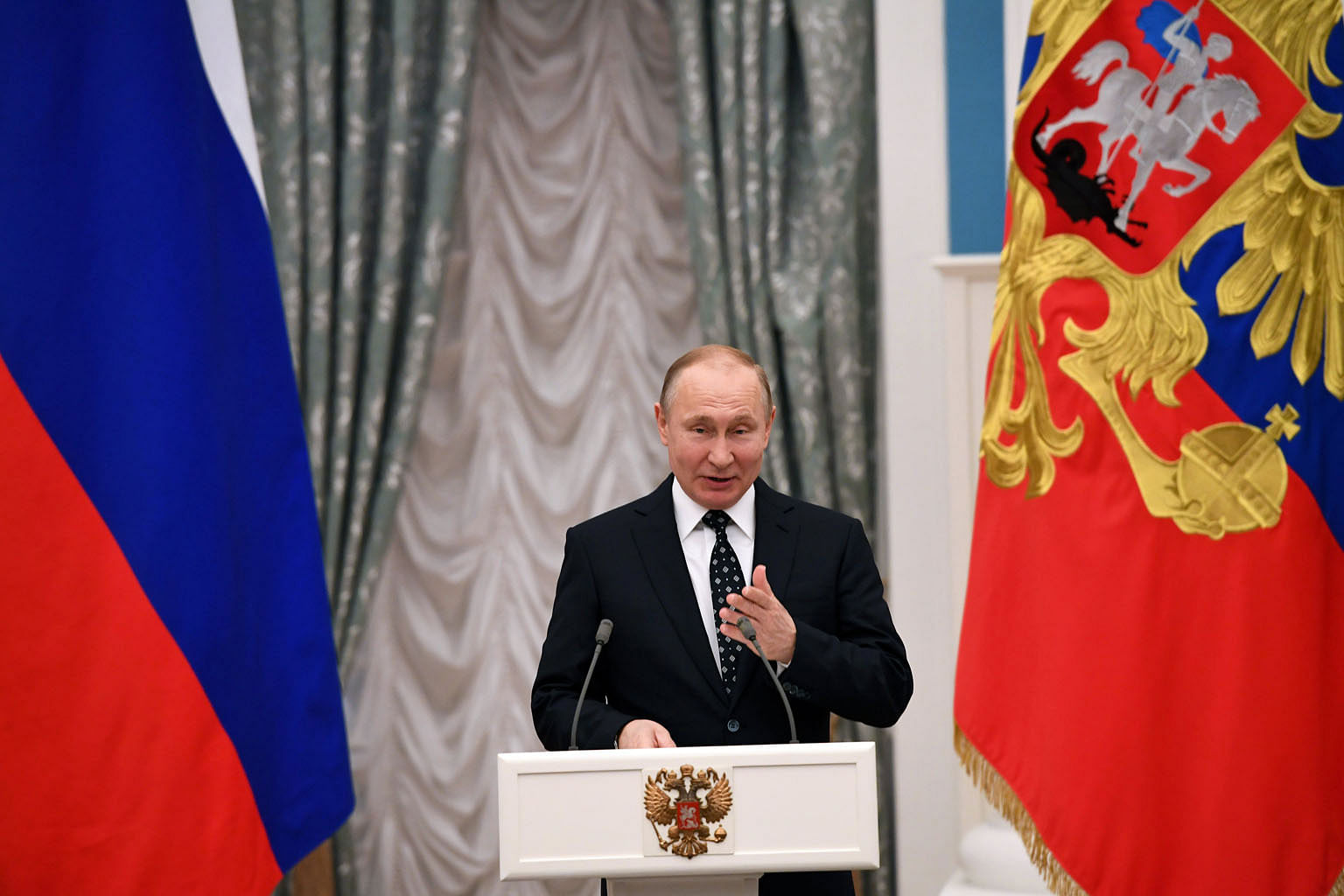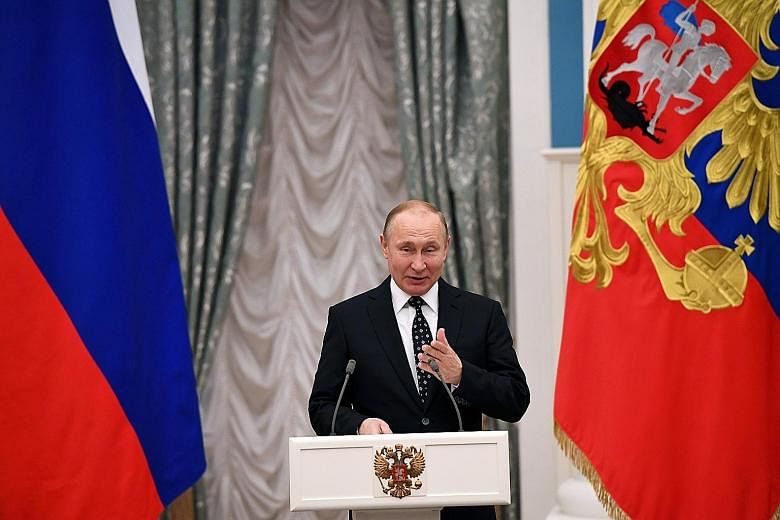Putin 4.0
Editorial
The Statesman, India
The Russian President's re-election was a settled fact long before the first vote was cast. Nonetheless, the critical point of interest both for the country and the world must be that he is poised to begin his fourth six-year term as President, with an interregnum as prime minister.
This is the cardinal message that has fetched him the appellation of "Putin 4.0". The decimal has seldom been more relevant in a country's political history.
The triumph coincides with a particularly critical phase in Russian history over the past few years - Mr Putin's annexation of Crimea, the expansionist designs in Ukraine, the aerial bombardment of Syria, the tit-for-tat expulsions of Russian and British diplomats over an attempted murder with a nerve gas agent, and most recently the US sanctions against the Kremlin's meddling in President Donald Trump's election.
In a word, the past six years have brought Russia into deepening conflict with the West.
Despite the fact that his foreign policy was mired in controversies and adventurism, the West will have to accept the irony that Mr Putin has emerged from his third term far stronger than he was in 2012.

The annexation of Crimea in 2014 served to establish his legacy and ignited a clash with the West that ironically once more has helped bolster his standing.
It is a platform from which he seems unlikely to step down. Clearly, more than domestic governance it has been foreign policy - mortally reckless by any reckoning - that is playing a pivotal role in Mr Putin's Russia.
The riveting point of interest in the Kremlin at this juncture is whether Mr Putin is assured of a fifth term in 2024. It is as yet uncertain whether he will work towards a transfer of power that will ensure his security as well as that of a fairly large number of people who form his coterie. Given current trends in China, a "President-for-life" in Russia cannot readily be ruled out.
Putin's win won't lead to stable Russia
Editorial
The Yomiuri Shimbun, Japan
It is worrisome that with Vladimir Putin having won the "trust" of voters, it has become more likely that he will maintain his hardline foreign policy.
The voting and vote-counting day of the presidential election was set for March 18, the day when Russia annexed the Crimean peninsula of Ukraine four years ago. It was obviously aimed at stimulating nationalistic fervour, leading to voters' support of Mr Putin.
It cannot be overlooked that Mr Putin flaunted "changing the status quo through force", which has destabilised the international order, as an achievement of his administration and utilised it for the election. Russia's conflict with the United States and European countries deepened further during the presidential election.
A former Russian spy, who had worked for Russian military intelligence and later took refuge in Britain, and his daughter were rendered unconscious after coming into contact with a suspicious substance.
British Prime Minister Theresa May pointed to Russia's involvement in the attack, saying the substance was a nerve agent that had been developed by the former Soviet Union, and took such measures as expelling Russian diplomats and others.
The fact that the leaders of the US, Germany and France also fell in step with Britain in condemning Russia holds significance. The US administration under President Donald Trump issued for the first time sanctions against Russia's cyber attacks that occurred during the 2016 US presidential election.
As Russia's economy, which depends on energy resources, is hit by sanctions imposed in the wake of its annexation of Crimea, people's discontent smoulders over low economic growth and widening economic disparity.
Mr Putin has taken a stance of countering the US by beefing up the country's nuclear force, but it would be difficult for him to maintain a unifying force solely by playing up a "strong Russia".
For Japan, the biggest pending problem in its diplomacy towards Russia is the issue of the northern territories. To keep the US forces stationed in Japan and South Korea in check, Mr Putin had land-to-ship missiles deployed on the islands of Kunashiri and Etorofu.
He also asserts that "if the islands are handed over to Japan, the US military could deploy on them". The intensifying conflict between the US and Russia has, without doubt, affected the territorial issue.
Prime Minister Shinzo Abe will visit Russia in May and hold talks with Mr Putin. Mr Abe should try to achieve progress on the issue by tenaciously conveying to Mr Putin the significance of Japan's economic cooperation.
China, Russia working for shared future
Zhou Li
China Daily, China
With Xi Jinping being unanimously re-elected as President of China and chairman of the Central Military Commission, and Vladimir Putin winning a new term as President of Russia, world attention has again shifted to the two countries.
As Sino-Russian relations enter a new era, mutual cooperation and support have deepened in political, economic, scientific and technological, security and cultural fields, as well as in international and regional affairs.
And, as Premier Li Keqiang said on Tuesday, there is still huge potential for further development.
The Sino-Russian partnership has set a good example for countries with different social systems to seek consensus, build joint security mechanisms and establish mutually beneficial cooperation.
From a strategic and long-term perspective, the two countries' leaders have built a new type of state-to-state relations.
The profound changes in overall international and regional situations, the various complex and intertwined contradictions, and the increasing destabilising factors will create both opportunities and challenges for Sino-Russian relations in the coming years.
Dealing with the Sino-Russia camp
Editorial
The Korea Herald, South Korea
China and Russia have lurched towards dictatorships of one-man rule, raising concerns about a new Cold War in the 21st century.
If authoritarian systems take root in the two powers, without doubt, conflicts between the US and China and between the US and Russia will intensify.
Summits between South and North Korea and between the US and North Korea are expected in April and May, respectively, but China and Russia are inseparable from the denuclearisation of the Korean peninsula, as they are closely related with the North in many ways.
Two opposing camps are expected to form: the US and Japan versus China and Russia.
It is the stark reality that the North Korean nuclear issue cannot be resolved without active cooperation from China and Russia. Although both countries oppose the North's nuclear armament and its possible domino effect on East Asia, they would not be pleased with an abrupt collapse of the regime in Pyongyang. Also, they are wary of growing US influence, among other factors.
Under their renewed leadership, China and Russia are certain to expand their influence on the North's denuclearisation, probably through diplomacy based on power. This could complicate and destabilise the situation.
If the US-North Korea summit achieves a breakthrough in the nuclear issue, President Putin is likely to spur Russia's economic and energy cooperation with South and North Korea. In this case, there is a possibility of Russia pushing to ease or retract sanctions against the North at the United Nations Security Council.
Russia, which has often moved in step with China to keep in check the expansion of the US' influence on East Asia, is likely to intervene in denuclearisation efforts.
Therefore, the South Korean government must keep in mind that the North's nuclear issue is more than just a matter between the two Koreas and the US, as it is likely to develop into a more complicated and difficult issue involving China, Russia and Japan.
The Seoul government needs to build up its diplomatic capabilities to find and expand common interests with Beijing and Moscow, while fending off their attempts to overpower their neighbours.
• The View From Asia is a compilation of articles from The Straits Times' media partner, Asia News Network, a grouping of 23 news media.

